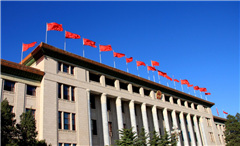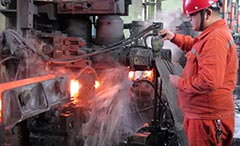NDRC: Overcapacity top reform priority for 2017
2016-12-19
China Daily
China’s top economic planner said on Dec 17 that cutting excess production capacity will be a priority for its work next year.
The National Development and Reform Commission will continue to push supply-side reform, including cutting overcapacity, destocking, deleveraging, reducing corporate costs and shoring up weak links in the economy, according to a statement after its annual work conference.
“Substantial headway must be made in carrying out these tasks,” the statement said, adding that breakthroughs should be made in crucial fields, while multiple policies will be implemented to boost demand and ensure healthy economic development.
The commission will use market and legal tools to balance overcapacity reduction with stable supply, and structural optimization with industrial upgrades, Xu Shaoshi, head of the commission, was quoted as saying.
The NDRC said it will also control the leverage ratio of the nonfinancial corporate sector, and further cut taxation and fees for corporations.
More central government funds will be invested in poverty reduction, agriculture, post-disaster water conservancy, infrastructure and innovation, Xu said.
Top leaders and policymakers have reached a consensus on supply-side reform after calls to press ahead with restructuring at the three-day Central Economic Work Conference, which ended on Dec 16.
Yang Weimin, vice-minister of the Office of the Central Leading Group on Finance and Economic Affairs, said China will promote development of the real economy, ensure development of the real estate market and push agricultural supply-side reform aimed at providing green and safe products.
“They are the top priorities next year,” he said on Dec 17 at a forum held by the China Center for International Economic Exchanges that was attended by senior government officials and researchers and focused on discussions at the Central Economic Work Conference.
Yang said China will expand the scope of overcapacity reduction from not only steel and coal mining, but also to other sectors, adding that a market-oriented approach must be adopted.
He said focus will be placed on reducing real estate stock in third- and fourth-tier cities next year, with efforts to build more low-price, subsidized housing and boost the rental market. This comes after policymakers at the work conference said that “homes are built to be lived in, not for speculation”.
Yang urged enterprises to lower their high leverage levels, which have resulted from borrowing from banks and other financial channels to sustain and expand their businesses.
“It is a top priority,” he said, and efforts “must be carried out unswervingly” as interest rates on that debt constitute a heavy financial burden for enterprises, possibly leading to an industrial hollowing-out that could undermine the real economy.


